Where to retire: Cape May, NJ
With one of the nation’s best collections of Victorian ‘painted lady’ homes, Cape May has cultural and dining superlatives to help it rise above a typical Atlantic Ocean beachfront locale.
The setting is perfection for the snooping around of the internationally known Victorian-era crime-solving duo Sherlock Holmes and Dr. Watson. Cape May, where some of the country’s most popular Sherlock Holmes events happen every year, has an abundance of Victorian homes, enough to land it on the National Register of Historic Places. Several blocks of the New Jersey shore town bloom with gabled and gingerbread-trimmed houses. Many serve as bed-and-breakfasts, welcoming guests with tea or lemonade offered in parlors decorated with Queen Anne sofas, velvet drapes and fringed lamps.
As locals know, Cape May, on the southernmost tip of New Jersey, is much more than another seaside retreat.
“Cape May is a nice Victorian town,” says Michael Potts, 55. “It has terrific restaurants, great beaches and is laid-back. It has exactly what we were looking for.” After his retirement in June 2013 as vice president of marketing for a food company, he moved with his wife, Mary McArdle, 55, a former financial coordinator for a law firm, to Cape May from Newtown Square, PA, about 15 miles outside Philadelphia.
For Robert and Jean Parente, Cape May provides the perfect mix ob beaches and Victorian ambiance. “I like being outdoors,” says Robert, 53. “There’s endless walking in town and a path along the beach. The beaches are clean; the architecture is beautiful.”
The Parentes moved to Cape May in January from Middlesex County, NJ, about 145 miles away. “I like history,” adds Jean, 55. “It’s great just to walk down historic Columbia and Washington streets where there are beautiful old homes that are well-maintained.”
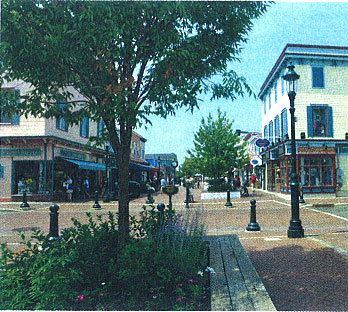
Though summers in Cape May bring thousands of visitors, the city maintains a small-town feel, evident in the family-owned shops along pedestrian-friendly Washington Street Mall
The architecture and the historical designation are only a part of what distinguishes Cape May from other shore towns in Cape May County, a region stretching 30 miles along the Atlantic Ocean south from Ocean City to Sea Isle City, Avalon, Stone Harbor, Wildwood and finally Cape May.”It’s the town that makes the beach special,” says Susan Krysiak, communications coordinator at the Mid-Atlantic Center for the Arts and Humanities in Cape May. The organization supports the town’s many festivals and events, offers guided trolley tours and manages three historic sites — the Cape May Lighthouse, the World War II Lookout Tower (once used to protect American shores) and the gussied-up grande dame, the Emlen Physick Estate, a restored Victorian mansion regularly open for tours.
“There’s a lot of interest in the arts and there’s a lot more activity in Cape May year-around than in many other Jersey shore towns,” says Scott Griffith, 69, a former Philadelphia attorney who retired in late 2005 and moved here in 2006.
Among Cape May’s charms is the fun it finds in its heritage. Holmes and Watson, in the form of witty impersonators, headline the March and November Sherlock Holmes weekend getaways. A murder-mystery dinner tests the clue-finding skills of attendees during the Victorian Weekend held each fall. Participants also tour homes, indulge in wine tastings, watch plays and browse crafts and antique shows. The spirit of another prominent Victorian, Charles Dickens, enlivens Cape May each December with a lecture series and feast. Other holiday events include candlelight tours, Christmas ghost tales and musical trolley rides to meet Santa.
Trolley tours wind through the historic district, with a guide pointing out the postcard-pretty properties, both public and private, and the differences among styles such as stick (Emlen Physick Estate) or Italianate (The Mainstay Inn). Riders also learn about two disastrous fires, on that forever changed the town.
In the 19th century, the rich and famous traveled to Cape May by steamboat and railroad from Philadelphia, Baltimore and Washington, DC. Notables included Presidents James Buchanan, Franklin Pierce and Ulysses S. Grant.
Spurred by such high-society tourism, entrepreneurs built large hotels, including the Mount Vernon, which could accommodate 2,100 guests. The mammoth hotel, however, burned to the ground in 1856.
But the worst fire started on Nov. 9, 1878. By the blaze’s end, the flames had destroyed about 40 acres that stretched from Congress Hall to Ocean Street, consuming many large and small hotels as well as businesses and bath houses. Hurriedly rebuilding for the coming season, the locals eschewed the costly and long construction time required for big properties, instead building smaller inns and cottages that had plenty of spare rooms for summer guests. Many of these are the painted ladies admired on trolley tours.
The town also supports two stages. Last season the East Lynne Theater Co. hosted plays March through December, and the Cape May Stage had productions May through December. Music is celebrated at the Cape May Music Festival held each spring, featuring chamber ensembles, jazz bands and musicians from the New Jersey Symphony Orchestra.
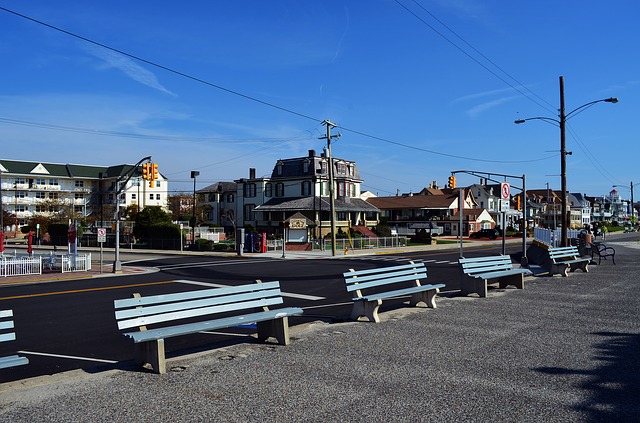
Cape May Beach Promenade
Then there’s the beach — wide, white and edged by a paved promenade that stretches for some 2 miles. “Cape May draws people who enjoyed summers here as kids and come back to live the lifestyle as adults,” says Carol Menz, a specialist in retirement relocation and the broker-owner of Coastline Realty.
The Parentes, who vacationed in Cape May for 10 years before purchasing, devised a retirement strategy. “Rather than wait another 10 years and hope we can afford to retire here, we decided to plan to grab the dream,” Jean says. “If we found a dream home with an appropriate layout that we can see ourselves living in into our old age, then we would buy that house.”
When they found the right house — a 1980, three-bedroom, two-bath ranch, 8 blocks from the coast in the Village Green neighborhood — they purchased it for $515,000 and then put about $300,000 into the renovation.
To afford their retirement dream, the Parentes plan to work for a few more years. Jean manages a three-doctor practice in nearby Stone Harbor. Robert, a computer systems analyst for AT&T Inc., works from their home in Cape May.
In 2009, Michael and Mary bought a 1939 Craftsman-style bungalow 3 blocks from the shore as a vacation home. “We wanted something with good bones and a comfortable layout on a wooded lot with a garden and we wanted character, and not a cookie-cutter home,” says Mary, who retired in 2011. They began renovations on the house last year and then moved in.
Cape May, situated on a major flyway, also draws bird-watchers. In spring and fall, people with binoculars visit Cape May Point State Park, a prime place for spotting thousands of Canada geese and other migrating birds that rest here either before or after crossing Delaware Bay. At Cape May National Golf Club, in nearby Erma, NJ, people enjoy the 50-acre sanctuary or the property. Wildwood Golf and Country Club, in the community of Cape May Court House, is another course in the area.Like all popular seaside getaways, Cape May draws summer crowds. The census lists the population at 3,607, but Bernie Haas, owner of Cape Publishing, a company that produces Cape May Magazine and CapeMay.com, estimates that the summer population swells to 40,000 on weekends and roughly 25,000 during the week.
That’s why savvy retirees choose the location of their home carefully. Michael and Mary wanted to be able to walk to the beach, walk or ride their bikes to downtown and park their car easily. “We are about a mile from the center of Cape May’s historic district,” Michael says. “The beaches are wide open here.”
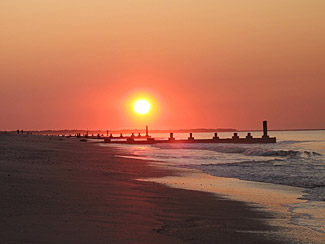
Cape May Shore
Residents also need to understand the summer traffic flow. “Saturday is typically the changeover day for rentals, with the last week’s renters leaving in the morning and the new renters arriving in the afternoon,” says Jim Ridgway, a real estate agent with Wilsey Realty in Cape May. Most locals know to avoid the sands on Saturdays.”Another potential negative: Cape May’s winters. “It’s chilly and it can be windy in December, January and February,” Haas says. Some retirees don’t mind the weather and like the quiet, but others leave town. “We have many retirees who have second homes in Florida or go south for three months in the winter when it’s cold,” he says.
Some visit their relatives or friends elsewhere in New Jersey, Pennsylvania, New York, Delaware and Maryland. “We both have siblings as well as eight nieces and nephews in the Philadelphia area,” Mary says. “We like that we’re only two hours away.”
Along with proximity to the Mid-Atlantic’s big cities, Victorian architecture, wide beaches, cultural programs and festivals, Cape May has another draw: food. Arguably, Cape May has the best restaurants in New Jersey — the Washington Inn, The Ebbitt Room, 410 Bank Street, Oyster Bay, Peter Shields Inn,” Ridgway says. “Some people drive an hour just to eat in Cape May. The Lobster House, right on the harbor, does 2,000 dinners a night in season.”
Many of the area’s fine restaurants are in or near the historic district, which is Cape May’s downtown. 410 Bank Street offers a mix of New Orleans French and Caribbean flavors, and the Washington Inn serves American cuisine in an 1840 plantation-style house. Waterfront Peter Shields Inn and Restaurant, located in a 1907 Georgian Revival mansion, gets high marks for its innovative American fare.
Not all restaurants are expensive. “One of the beauties of being here is that many of the restaurants do not have liquor licenses, so you can bring your own wine and have a very good meal with wine without paying a lot,” Mary says.
Residents purchase that bottle in town or at one of Cape May County’s handful of wineries. The annual Cape May Food and Wine Celebration showcases the region’s culinary delights. This year’s event in September includes a gourmet brunch walk, winery cellar tour and tasting, chocolate lover’s feast, bourbon tasting dinner, chefs’ dine-around and Cape May lobster bake.
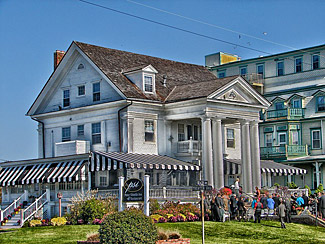
Peter Shields Inn
Downtown shopping is good, too. Washington Street Mall, a 3-block pedestrian walkway within the historic district, features scores of shops, including T-shirts, beachwear, toys and books, plus pizzerias, ice cream parlors, a cafe and bakery and other eateries.
The city is big enough to offer many volunteer activities. Robert has joined the Coast Guard Auxiliary, assisting with graduation ceremonies and dinners for the families. He looks forward to giving boating courses and doing search-and-rescue work.
Scott, a widower, joined the Episcopal church choir and became a Kiwanis Club member. What else does he like about Cape May? “I noticed that people here do things that they always wanted to do,” he says. “I signed up for three different literary groups. I got motivated and wrote a legal thriller, ‘Cold Spring.’ It has sex and violence and takes place in a fictional version of Cold Spring Village, a town in Cape May County.” He is happy to report that the book was published.
Good things happen in Cape May, says Scott, who remembers coming to the city as a child to visit his grandparents. “In the 1980s, I brought my wife and kids down in the summer for the beaches,” Scott says. “Whatever retirement plans I had went in the bucket. I came back to Cape May and love it.”

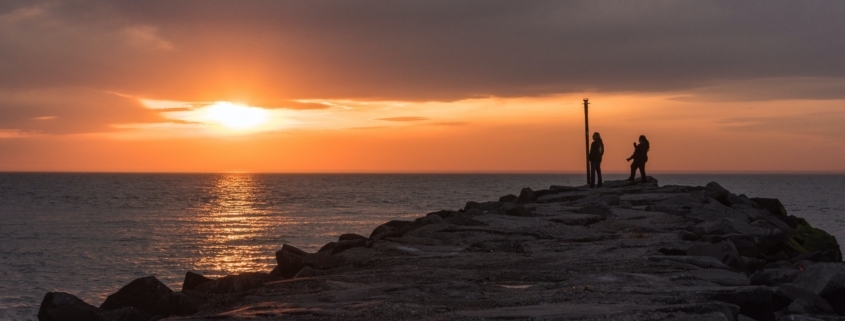
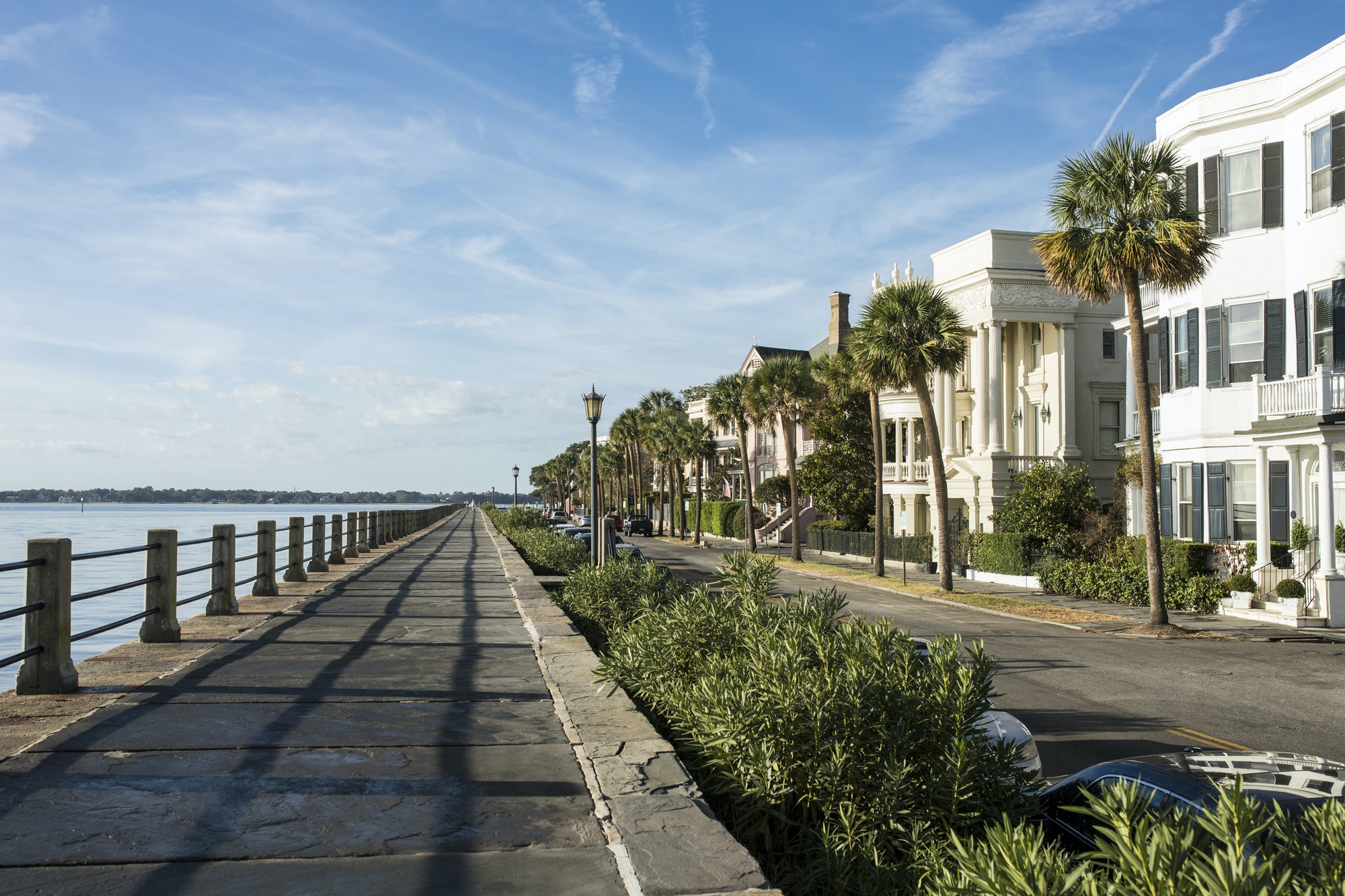 Where to Retire
Where to Retire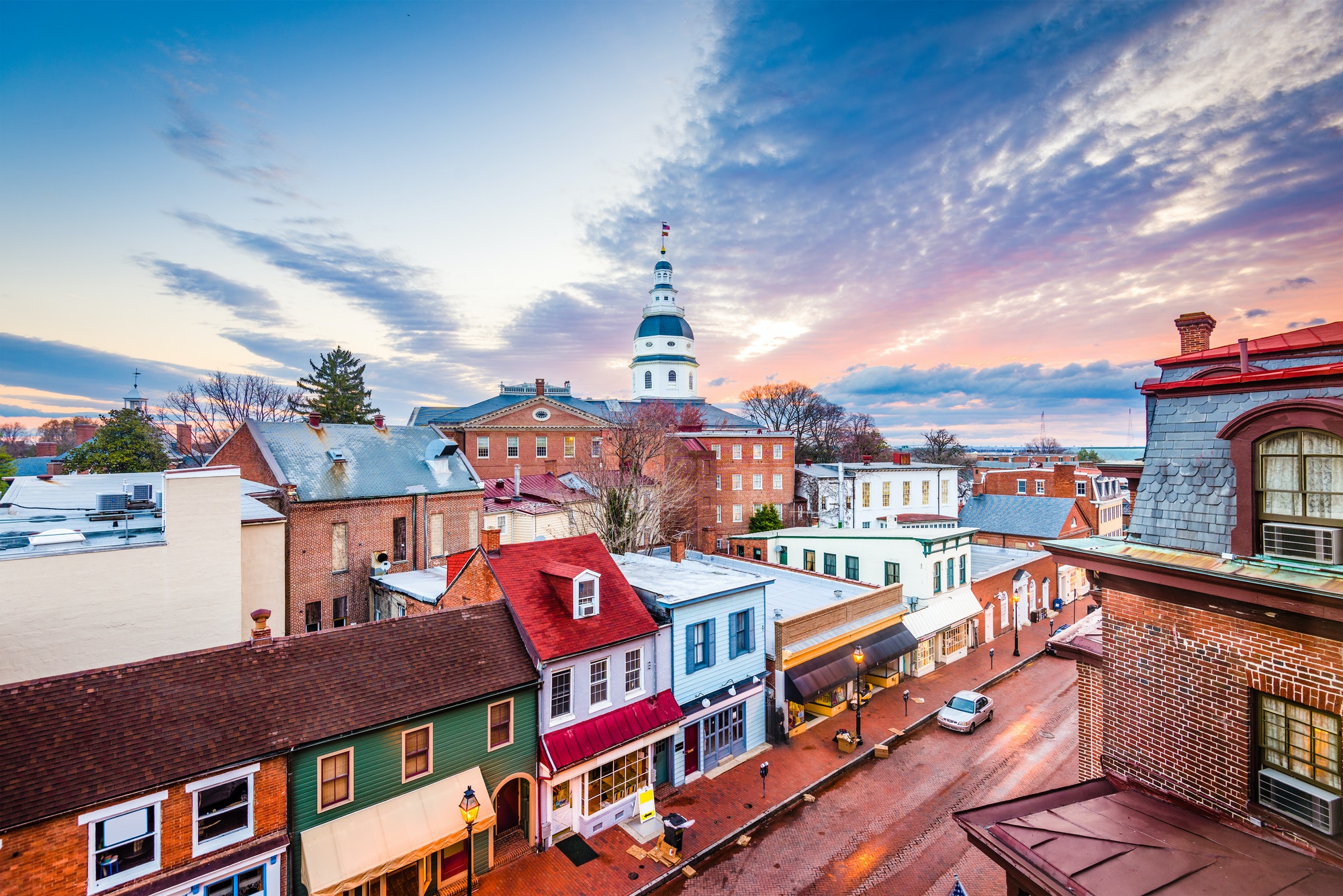 Where to Retire
Where to Retire Where To Retire
Where To Retire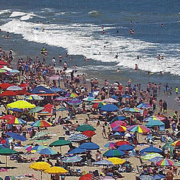 Where to Retire
Where to Retire
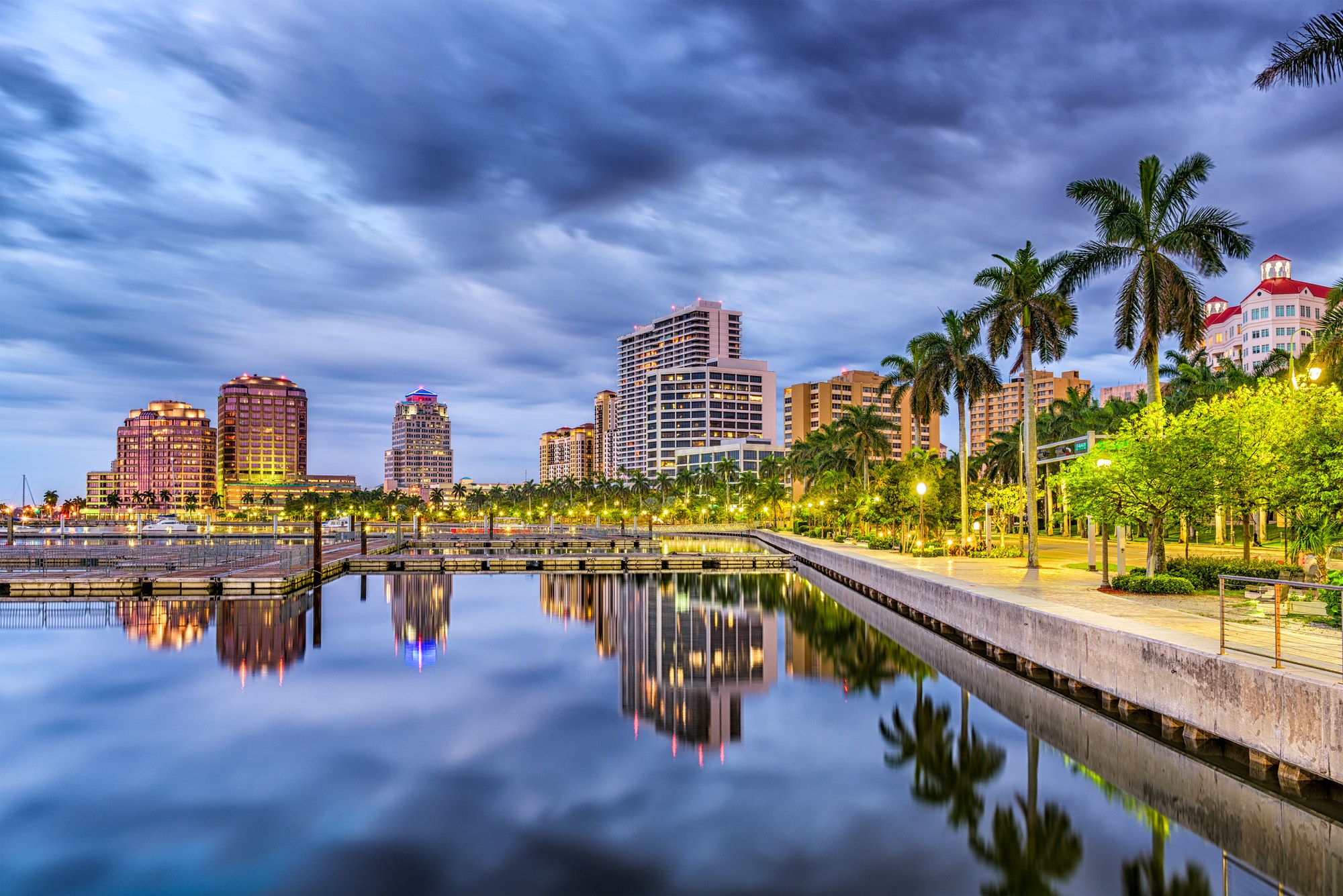 Where to Retire
Where to Retire CruiseCritic.com
CruiseCritic.com Great Family Vacations
Great Family Vacations